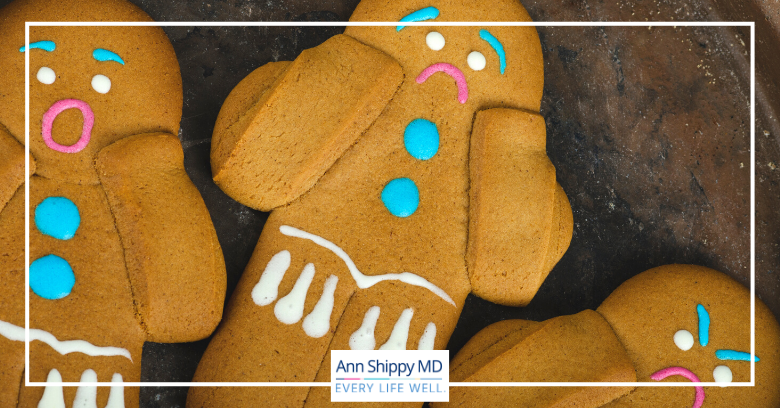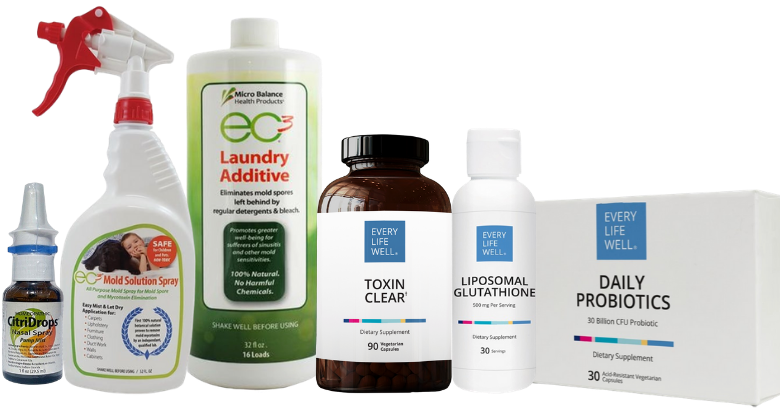What’s a winter wonderland without sugar fairies and hot cocoa? Think of minty candy canes guarding a frosted palace of gingerbread. Gummy droplets strewn like Christmas lights on desserts…
The holidays are definitely the season of sugar. With gingerbread houses, sugar cookies, cocktails, dishes heavy with processed condiments and sauces — they all contribute to a sugar overload. It’s easy to unconsciously double or triple your sugar consumption during holiday eating.
Of course, sugar doesn’t pertain only to the landscape of holiday treats. Unless you’re reading labels diligently and actively avoiding sugar, chances are you’re consuming a lot of sugar throughout the year.
When you consume sugar for a long period of time — say years and years — it interferes with your body’s hormones. Once hormones are out of balance your glucose levels will increase in the blood. Your pancreas responds to high glucose by releasing more insulin and too much of it makes your body store fat. This is a major reason why so many people struggle with weight loss. When you don’t understand how hidden sugars have imbalanced your body, it’s much harder to lose weight.
One hormone in particular is affected by insulin: leptin. Leptin tells your hypothalamus to tell you to stop eating. It’s what regulates our satiety. But sugar can really mess up leptin’s role by obscuring its message to the brain and causing you to overeat. If your body can’t tell it’s full, it tells you to eat more and more.
Most sugary foods are also low on nutrients. When your body isn’t getting the proper fuel, it’s functioning on a deficit, so it makes you constantly eat more to satisfy the nutrient cravings. But if you’re reaching for processed foods, sugar-filled foods and bad-fat foods, you’re only exacerbating the nutrient deficiency, and you therefore crave more food.
Do you see a pattern here? For many, chasing these needed nutrients becomes a downward spiral — a fruitless loop, if you will.
In 2017, the Centers for Disease Control and Prevention released a shocking statistic showing that almost 40 percent of American adults and nearly 20 percent of adolescents are obese. Never has the United States seen these rates of obesity. Plus, more than 100 million Americans have diabetes or are prediabetic. That’s almost one-third of the US population!
Journalist Gary Taubes wrote about the link between sugar and the health of Americans and the rest of the world in The BMJ. Taubes argues against the dominant point of view that eating high fat foods are the cause of obesity.
He and others have raised the question of why the “twin epidemics” of obesity and diabetes have gotten so out of control — despite many best-effort campaigns by medical professionals, governments and scientists.
Taubes argues that instead of focusing on the caloric count of high-fat food consumption, we should be examining our sugar intake, especially with calorific sweeteners. In other words, sugar makes you fat more than fat itself makes you fat. This fact is the opposite of what we were told in the “low fat” 80s and 90s.
Sugar consumption has a strong association with poor health outcomes. Ever the cautionary journalist, Taubes warns that evidence that sugar has harmful qualities independent of its calories is still ambiguous. “If it is true, though, it changes how we must communicate the dangers of sugar consumption,” he writes. Making ourselves aware of how sugar consumption imbalances the body is a beginning to effective health-driven communication.
I advise my patients to cut out sugar completely, because there’s overwhelming evidence that point to sugar as a variable for illness. Not only are diabetes and obesity linked to sugar consumption, but studies are showing that sugar has indirect links to cancer, inflammation, and anxiety.
As we eat our way into 2020, there are seven things you can begin doing to stop the sugar overload.
- Read all food labels and pay special attention to less-obvious sugary ingredients like dextrose, maltose, malt syrup, lactose, and evaporated cane juice. Learn about hidden sugars and make different choices in favor of more simply and purely made foods. Check carefully with salad dressings, breads, fruit drinks, shake powders and nearly every type of processed food. This linked study examined 85,451 processed foods purchased during 2005–2009. A whopping 75 percent of them contained sweeteners.
- Eat the good stuff first. Make it a point to consume more protein and fresh vegetables before loading up a dessert plate, so you’re more likely to feel more satiated and slow yourself down. You might even eat your own healthful food before you go to a social gathering to make sure you are not too tempted.
- If you do fall off the bandwagon, forgive yourself. It won’t help you succeed if you beat yourself up when you overdo it. Acknowledge that you can get back on track. Get to the root of what caused you to go overboard and see what answers arise. Take it as a lesson and make a commitment to make better dietary choices.
- Take some probiotics. See my blog article, Controlling Cravings: Are You the Hand, or the Puppet? which discusses how your gut biome may actually be influencing your cravings and food decisions. Taking a high quality probiotic has shown to increase bacterial diversity which can reduce cravings and even decrease food intake overall.
- Be active. Don’t hang out around the dessert table. Go for a walk post dinner or take the conversation out of the kitchen. Make time to exercise as well. It will help your mood during those social gatherings while keeping you in shape.
- Satisfy your sweet tooth using nature’s own sweeteners. Before you argue that life’s too short to skip that triple-frosted sugar cookie, I want to remind you that fresh fruits that are low in sugar like blackberries, raspberries, cantaloupes and watermelons are good sugary dessert substitutes. Try them with a small amount of So Delicious Dairy-Free Coco-Whip for a #SmartSplurge treat!
- If you must indulge, use better sweeteners. Studies have proven that artificial sweeteners like saccharin, aspartame, and sucralose alter our gut biome in negative ways and contribute to glucose intolerance. Sugar alcohols like xylitol and sorbitol are also not ideal. If you need a sweetener, try organic honey, maple syrup, or pure liquid stevia (no fillers) in very small amounts.
Life is so sweet already. Adding sugar to your diet detracts from your life, so let’s approach 2020 by celebrating all of life’s sweetness in other forms. Happy Holidays, and Happy New Year!













